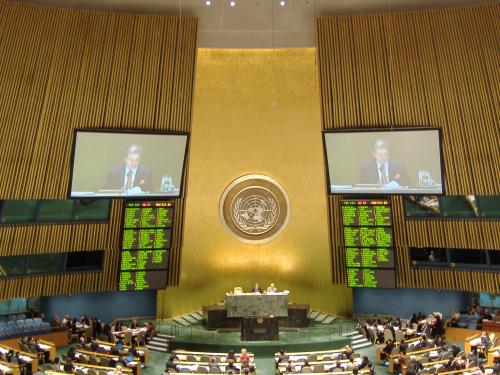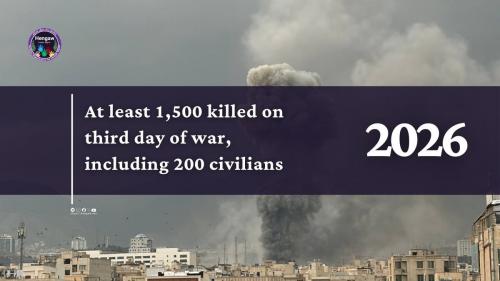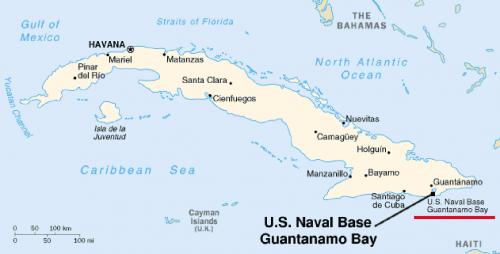13 May 2017 :
- On 3 April 1997, in Geneva, the UN Commission on Human Rights approved a landmark resolution against the death penalty, with 27 votes in favour, 11 against and 14 abstentions. The resolution, cosponsored by 47 countries, was submitted by the Italian Government on the initiative of Hands off Cain and the Italian Parliament. For the first time, a body of the United Nations saw the death penalty as an issue directly related to human rights, considering its abolition an "enhancement of human dignity and a progressive development of human rights" and calling for a moratorium to be adopted by Member States with a view to its final abolition.
- On 3 April 1998, the UNCHR approved an abolitionist resolution for the second year running, which this time created a precedent by explicitly called for "a moratorium on executions with a view to the complete abolition of the death penalty", with 26 votes in favour, 13 against and 12 abstentions. The resolution was sponsored by 65 countries -18 more than the previous year. New sponsors included: Britain, which had abstained in 1997; Russia, Azerbaijan, Armenia and Georgia; Argentina, Mexico and Panama; Angola, Cape Verde and Mali, which joined South Africa, the only African cosponsor in 1997. Bosnia and Herzegovina was the first Muslim cosponsor, and Morocco, Senegal and Tunisia abstained from the final vote. There would actually have been 28 favourable votes if the representatives from cosponsor Mali and abolitionist Mozambique, who had said they would say "yes" to the resolution, had been present at the voting.
- On 28 April 1999, the UNCHR in Geneva passed, for the third consecutive year, a resolution for the moratorium on executions and the abolition of the death penalty, with 30 votes in favour (4 more than the previous year), 11 against (2 less than the previous year since Bhutan and the Democratic Republic of the Congo abstained) and 12 abstentions (the same as in 1998). The resolution, presented by Germany on behalf of the European Union for the first time, was cosponsored by 72 countries - 7 more than the previous year, setting a new record for cosponsors of a resolution voted by the Commission. As well calling again for a "moratorium on executions with a view to the definitive abolition of the death penalty", the strongest political and juridical elements in the text approved in Geneva were the requests that: individuals not be extradited to countries where they risk execution; reservations be withdrawn to the article of the International Covenant on Civil and Political Rights that forbids the execution of minors; nonviolent crimes, such as those connected with finance, and the expression of religious beliefs be exempt from the death penalty; capital sentences not be carried out until all avenues of appeal have been exhausted also at the international level. In the hope of having the resolution for a moratorium on executions passed, a delegation from Hands off Cain presented the appeal for a moratorium launched by Nobel Laureates and international personalities to UN High Commissioner for Human Rights Mary Robinson.
- In November 1999, the EU initiative met with a grave setback at the 56th session of the General Assembly. A resolution that aimed to abolish the death penalty and called for a moratorium on executions, proposed by Finland on behalf of the European Union and supported by 72 countries, was later withdrawn. Egypt and Singapore had presented amendments, endorsed by 72 States, which affirmed two principles already stated in the UN Charter; namely, every State has the right to choose its own political, social and cultural system, and the UN must not encroach on the domestic jurisdiction of States. Mexico had suggested that the references to national sovereignty be offset by specifically defining in the text of the resolution the UN´s role in the promotion and respect of human rights within States, but the European Union rejected this proposal and, immediately afterwards, decided not to put the resolution for the moratorium to the vote at the General Assembly.
- On 26 April 2000, the UN Commission on Human Rights approved, for the fourth consecutive year, the resolution on the death penalty presented by Portugal, as President of the European Union. The text (2000/65) was similar to that adopted 1999, which called for a world-wide moratorium on executions and adherence to UN safeguards in capital cases. This year´s resolution included an additional paragraph welcoming the Secretary-General´s sixth quinquennial report on capital punishment. The resolution was cosponsored by 68 countries and was adopted by 27 votes to 13 with 12 abstentions. With this vote, the European Union has begun to make up the ground it lost by withdrawing the resolution from the final vote at the General Assembly in November 1999
- On April 25, 2001 the UN Commission on Human Rights approved, for the fifth consecutive year, the resolution on the death penalty presented by the European Union. The text, had 65 cosponsors, called for a world-wide moratorium on executions and adherence to UN safeguards in capital cases. The resolution was adopted by 27 votes to 18 with 7 abstentions. Oliviero Toscani made a statement on behalf of the Transnational Radical Party as Hands off Cain´s testimonial at the UN Commission on Human Rights.
- On 25 April 2002, the UN Commission on Human Rights approved, for the sixth consecutive year, the resolution on the death penalty presented by Spain, as President of the European Union. The text called for a world-wide moratorium on executions and adherence to UN safeguards in capital cases. The resolution was adopted by 25 votes to 20 with 8 abstentions. This notwithstanding the fact that in the last few years, due to the rotation of member states, the UNCHR has had a negative composition with more retentionist than abolitionist states becoming members, thus contributing to the reduction of votes in favour. The resolution was cosponsored by 68 countries, partly as a result of renewed efforts by HOC in Geneva.
- On 24 April 2003, the UN Commission on Human Rights approved, for the seventh consecutive year, the resolution on the death penalty presented by Greece, as President of the European Union. The resolution was approved with 24 votes in favour, 10 abstentions and 18 against. The 53rd member of the Commission, Algeria, declared itself absent from the vote. The text of the resolution on The question of the death penalty was strengthened with respect to the one used in the previous six Commissions and called on states "to abolish the death penalty completely and, in the meantime, to establish a moratorium on executions" rather than "a moratorium on executions, with a view to completely abolishing the death penalty". Notwithstanding, this text was supported by 75 co-sponsors, seven more than the previous year´s total of 68. Moreover Bolivia missed the deadline for co-sponsorship by a day and Kiribati´s written confirmation was not sent by the competent authority and therefore not considered valid. The resolution was sponsored for the first time by Cote d´Ivoire, Serbia and Montenegro, Timor Leste and Turkey, all countries that have recently abolished the death penalty. Other new co-sponsors at the UNCHR this year were Djibouti, Papua New Guinea and the Seychelles, whereas Guinea Bissau and Palau, that had already adhered at the UNGA in 1999, co-sponsored the text for the first time at the UNCHR. This positive result was obtained despite the climate of international tension caused by the war in Iraq and proves that the international community is now unyielding in affirming its duty/right to intervene in human rights issues, including the death penalty.
- Summer/Autumn 2003. HOC’s drive for the presentation of a pro-moratorium resolution to the 2003 UNGA by the Italian EU presidency did not achieve the required result. The Italian government, after solemnly announcing, time and again, its firm belief in and commitment to the worldwide moratorium campaign, then seized on every excuse not to press on with the initiative, in the face of all forecasts of a successful outcome and its declared conviction and commitment. It is necessary to note that HOC had, already in January 2003, made available to the Italian government a detailed Lobby Plan for the 2003 General Assembly. The same document was circulated to the other EU governments in June 2003. That plan, contained all the relevant information and the things to do in order to get the moratorium resolution approved at the UNGA, including bilateral steps to take and even forecasts, country by country, of how votes would be cast at the UNGA. In October 2003, with the UNGA already in session for a month, the Italian government finally decided to conduct a worldwide survey on voting intentions with regard to the pro-moratorium resolution. This survey confirmed, as 98% correct, HOC’s forecasts. However the poll indicating a favourable vote and more importantly a draft text of the resolution were circulated among the European partners too late to enable even those who believed in the proposal to support its presentation.
- On April 21, 2004, the UN Commission on Human Rights approved, for the eighth consecutive year, the resolution on the death penalty presented by Ireland, as President of the European Union. The resolution was approved with 28 votes in favour, 6 abstentions and 19 against. The worldwide trend towards the abolition of the death penalty was reflected in the record number of 76 co-sponsors for the resolution on the death penalty. This year’s total was one better than the previous year’s, when 75 co-sponsors were registered, and included one newly abolitionist country. Along with Iraq, that is provisionally abolitionist, another two countries that had never supported the initiative at the UN before signed on: Kiribati and Samoa. Other welcome support came from the Solomon Islands, that had co-sponsored the resolution at the 1999 UN General Assembly (GA), but never yet at the CHR. Israel, that had not co-sponsored the resolution since the 2000 CHR, renewed its support in 2004, and Bolivia, that failed to co-sponsor for the first time since 1997 in 2003, was again on board this year.
- On April 20, 2005, the UN Commission on Human Rights approved for the ninth consecutive year a resolution on the death penalty tabled the European Union (EU). The text was approved with 26 votes in favour, 17 against and 10 abstentions. A new record of 81 co-sponsors was reached, five more compared with the previous year. Eight countries – Cape Verde, Côte d'Ivoire, Djibouti, Guinea Bissau, Marshall Island, Russia, São Tomé and Principe and Turkmenistan – were recovered in 2005 that for at least a year were not renewed the cosponsorship, were recovered in 2005. Nigeria, which in 2004 voted against it, abstained in 2005, meanwhile Gabon and Congo passed from a vote in favor to abstention.
- 2006 The UN Commission on human rights becomes UN Human Rights Council.
- On December 18, 2007, the U.N. General Assembly adopted the resolution calling for a moratorium on the death penalty with a view to abolishing capital punishment. The vote in the 192-member world body was 104-54 with 29 abstentions. The vote capped a heated debate in the General Assembly's human rights committee that continued before and after the final vote. It saw the United States taking the unusual step of siding with countries such as Iran and Syria in opposition to the resolution. The Third Commission of the United Nations approved the resolution on November 15. The vote on the highly divisive issue was 99 in favor, 52 against and 33 abstentions. The United States and China joined many developing countries, notably from the Islamic world, in voting no after an acrimonious debate. Opponents decried what they saw as an attempt by the 87 co-sponsors to impose their values on the rest of the world and made it clear that there was no consensus on an issue which they said would further polarize the assembly. They argued that the death penalty was fundamentally a "criminal justice issue" to be decided by national authorities and saw the resolution as blatant interference in the internal affairs of sovereign states. Malaysia, Singapore, Singapore, Egypt, Barbados and the Bahamas were particularly vocal in denouncing an attempt to impose what they call Western values on the rest of the world. For a description of the struggle that led to the historic vote of 2007, see the website “INITIATIVE FOR A UN MORATORIUM ON DEATH PENALTY”.
- On December 18, 2008, the United Nations General Assembly approved, for the second consecutive year, the resolution with 106 in favour, 46 against and 34 abstentions. With respect to last year, votes in favour increased by two, votes against dropped by eight, and abstentions increased from 29 to 34. On November 20, 2008, the Third Commission of the United Nations’ General Assembly passed the draft resolution with 105 countries voted in favour, 48 against and 31 abstentions. Compared to the resolution approved by the same commission in 2007, there was an increase of 6 favourable votes, a decrease of 4 votes against, and two less abstentions. The resolution was introduced by the Chilean representative, under the name of a coalition or representative countries from all continents. There were 89 co-sponsors of the resolution this year, two more than the previous year. Countries for the death penalty presented 7 amendments. This included two affirming the principle of the internal sovereignty of nations, that if approved would have weakened the political strength of the text. They were all denied by a widening majority with respect to last year. In substance, the text (which is much more concise than the one in 2007) concentrated on the moratoria. It also relaunched the previous year’s resolution, favourably saluting the decision of countries that put into practice the moratoria. Reminding the Assembly of the global trend towards the elimination of the death penalty, the text welcomes the relevant Report by the Secretary General. The text establishes that the Assembly will return to discuss it within two years.
- On December 21, 2010, the United Nations General Assembly approved the new resolution with 108 votes in favour, 41 against and 36 abstentions (another 7 countries were absent at the time of the vote). It recorded a decisive step forward compared to 2007 when in a plenary assembly the votes in favour were 104, with 54 against and 29 abstentions (with 5 absent at the time of the vote). Another step forward was taken also in respect to the second vote on the pro moratorium Resolution in December 2008 when there were 105 in favour, 47 against and 34 abstentions (6 were absent at the time of the vote). The most significant political data regarding the favourable is that of 6 countries that in 2008 voted against (Kiribati, the Maldives and Mongolia) or abstained (Bhutan, Guatemala and Togo) or the abstentions of 4 countries (Comoros, Nigeria, the Solomon Islands and Thailand) that in 2008 voted against. The number of cosponsors of the Resolution also increased, 90 in total, three doing so for the first time: Cambodia, Russia and Madagascar.
- On 20 December 2012, the General Assembly of the United Nations advanced again its call to end the use of the death penalty with the passage of a new Resolution calling on States to establish a moratorium on executions, with a view to abolishing the practice. It was the fourth such text adopted since 2007. By its terms, the Assembly called on States to progressively restrict the death penalty’s use and not impose capital punishment for offences committed by persons below 18 years of age and pregnant women. States were also called on to reduce the number of offences for which the death penalty might be imposed. The Resolution was adopted by a recorded vote of 111 in favour (+3 with respect to 2010 Resolution) to 41 against (as in 2010), with 34 abstentions (+ 2) and 7 absent during the vote (as in 2010). Member States of the United Nations are now 193, a State more than in 2010, South Sudan, which voted in favor of the Resolution, although still maintains the death penalty. Central African Republic, Sierra Leone, Chad, Sierra Leone and Tunisia, which had abstained or were absent in 2010, for the first time voted in favor. The first three countries were targeted in previous months by a mission of Hands Off Cain and the Nonviolent Radical Party, Transnational and Transparty, aimed at getting their vote in favor of the Resolution. Indonesia and Papua New Guinea, which in the past had opposed the Resolution, for the first time abstained. On the side of the 'no' have gone instead Bahrain, Dominica and Oman, which previously abstained. Finally, Maldives, Namibia and Sri Lanka, which in 2010 had voted in favor, this time abstained. Five countries that are abolitionist de jure or de facto – Kiribati, Mauritius, São Tomé and Principe, Antigua and Barbuda and Ghana – were absent during the vote, as well as 2 retentionist countries: Gambia and Equatorial Guinea.
- On 18 December 2014, the General Assembly of the United Nations advanced again its call to end the use of the death penalty with the passage of a new Resolution calling on States to establish a moratorium on executions, with a view to abolishing the practice. It was the fifth such text adopted since 2007. By its terms, the General Assembly reiterated its call on UN member-States to progressively restrict the use of the death penalty and not to impose capital punishment for offences committed by persons below 18 years of age, on pregnant women and – as added this year – on persons with mental or intellectual disabilities. For the first time, Member States were urged to respect international standards that provide safeguards guaranteeing protection of the rights of those facing the death penalty, in particular the right of foreign nationals to receive information on consular assistance within the context of a legal procedure. The new Resolution was adopted by a record number of 117 votes in favour (+ 6 compared to 2012) and the lowest of the votes against, 38 (- 3 compared to 2012), with 34 abstentions (like in 2012) and 4 absent during the vote (- 3 compared to 2012). New votes in favour came from Equatorial Guinea, Eritrea, Fiji, Niger and Suriname, which had abstained or were absent during the vote in 2012. Noteworthy is especially the co-sponsorship, for the first time, of Sierra Leone and the vote of Niger, which was targeted by a mission of Hands Off Cain, aimed at getting its vote in favour of the Resolution. Also Kiribati and São Tomé and Principe, which were absent in 2012, voted in favour. In a further positive sign, Bahrain, Myanmar, Tonga and Uganda moved from opposition to abstention. On the contrary Papua New Guinea went from abstention to a vote against the Resolution. Finally, Nauru, which in 2012 had voted in favour, this time was absent during the vote, as well as three other countries that are abolitionist de jure or de facto – Mauritius, Lesotho and Swaziland.
- On 19 December 2016, the General Assembly of the United Nations reiterated again its call to end the use of the death penalty with the passage of a new Resolution calling on States to establish a moratorium on executions, with a view to abolishing the practice. It was the sixth such text adopted since 2007. The new resolution was adopted with 117 votes in favor (as in 2014), 40 no (two more than the 38 of 2014), while the abstainers were 31 (3 less than in 2014) and 5 absent at the time of vote (one more than in 2014). The text contains an amendment, voted in the Third Committee in November on a proposal of Singapore (76 votes in favor, 72 against and 26 abstentions), referring to the prerogatives of States to decide which type of punishment impose in the face of the most serious crimes but also new positive paragraphs. As for new votes in favor, coming mostly from the African continent and from countries that abstained before, they were those of Guinea, Malawi, Namibia, Swaziland, as well as that of the Solomon Islands and Sri Lanka. It casted a vote in favor also Nauru, that in 2014 was absent. Zimbabwe went from a contrary vote to one of abstention. Swaziland and Malawi were the target of a mission carried out by Hands Off Cain in November, with the support of the Italian Foreign Ministry as well as in 2014 Zimbabwe had been a target country of our mission. Instead, strengthened the front of no Burundi and South Sudan, previously in favor, and the Maldives, previously abstained. Passed from a vote in favor to a vote of abstention the Philippines, Seychelles, Equatorial Guinea and Niger, while Lesotho, absent in 2014, abstained this year. Among the absentees are the Democratic Republic of Congo and Senegal, both abstained in 2014, and Rwanda, formerly in favor. This year's resolution has been strengthened in the part that requires states to "make available the relevant information about the use of the death penalty" (among other things, disaggregated by sex, age and race data, and also the number of prisoners on death row, and information about scheduled executions). The General Assembly for the first time recognized the role that national human rights bodies to support local, national and regional debates on the death penalty. The Assembly for the first time highlighted the need for those who risk the death penalty to be treated with humanity and with respect for their dignity, in accordance with the international law on human rights.








